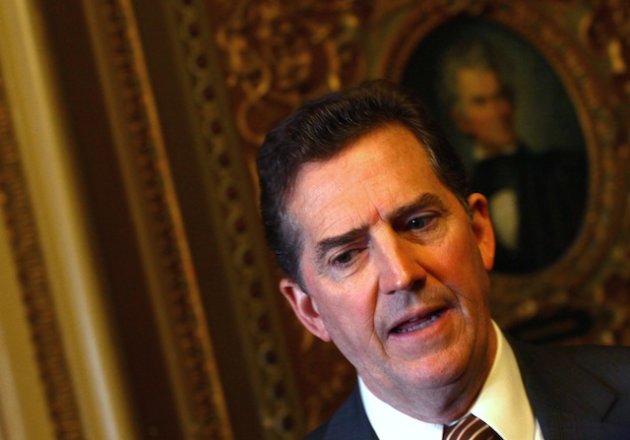DUBLIN (AP) — The top U.S. and Russian diplomats will hold a surprise meeting Thursday with the United Nations' peace envoy for Syria, signaling fresh hopes of an international breakthrough to end the Arab country's 21-month civil war.
U.S. Secretary of State Hillary Rodham Clinton, Russian Foreign Minister Sergey Lavrov and mediator Lakhdar Brahimi will gather in Dublin on the sidelines of a human rights conference, a senior U.S. official said. The official spoke on condition of anonymity because she wasn't authorized to speak publicly on the matter. She provided few details about the unscheduled get-together.
Ahead of the three-way meeting, Clinton and Lavrov met separately Thursday for about 25 minutes. They agreed to hear Brahimi out on a path forward, a senior U.S. official said. The two also discussed issues ranging from Egypt to North Korea, as well as new congressional action aimed at Russian officials accused of complicity in the death of lawyer Sergei Magnitsky.
The former Cold War foes have fought bitterly over how to address Syria's conflict, with Washington harshly criticizing Moscow of shielding its Arab ally. The Russians respond by accusing the U.S. of meddling by demanding the downfall of President Bashar Assad's regime and ultimately seeking an armed intervention such as the one last year against the late Libyan strongman Moammar Gadhafi.
But the gathering of the three key international figures suggests possible compromise in the offing. At the least, it confirms what officials describe as an easing of some of the acrimony that has raged between Moscow and Washington over the future of an ethnically diverse nation whose stability is seen as critical given its geographic position in between powder kegs Iraq, Lebanon and Israel.
The threat of Syria's government using some of its vast stockpiles of chemical weapons is also adding urgency to diplomatic efforts. Western governments have cited the rising danger of such a scenario this week, and officials say Russia, too, shares great concern on this point.
On Thursday, Syria's Deputy Foreign Minister Faisal Mekdad accused the United States and Europe of using the issue of chemical weapons to justify a future military intervention against Syria. He warned that any such intervention would be "catastrophic."
In Ireland's capital, one idea that Brahimi could seek to resuscitate with U.S. and Russian support would be the political agreement strategy both countries agreed on in Geneva in June.
That plan demanded several steps by the Assad regime to de-escalate tensions and end the violence that activists say has killed more than 40,000 people since March 2011. It would then have required Syria's opposition and the regime to put forward candidates for a transitional government, with each side having the right to veto nominees proposed by the other.
If employed, the strategy would surely mean the end of more than four decades of an Assad family member at Syria's helm. The opposition has demanded Assad's departure and has rejected any talk of him staying in power. Yet it also would grant regime representatives the opportunity to block Sunni extremists and others in the opposition that they reject.
The transition plan never got off the ground this summer, partly because no pressure was applied to see it succeed by a deeply divided international community. Brahimi's predecessor, former U.N. Secretary-General Kofi Annan, who drafted the plan, then resigned his post in frustration.
The United States blamed the collapse on Russia for vetoing a third resolution at the U.N. Security Council that would have applied world sanctions against Assad's government for failing to live by the deal's provisions.
Russia insisted that the Americans unfairly sought Assad's departure as a precondition and worried about opening the door to military action, even as Washington offered to include language in any U.N. resolution that would have expressly forbade outside armed intervention.
Should a plan similar to that one be proposed, the Obama administration is likely to insist anew that it be internationally enforceable — a step Moscow may still be reluctant to commit to.
In any case, the U.S. insists the tide of the war is turning definitively against Assad.
On Wednesday, the administration said several countries in the Middle East and elsewhere have informally offered to grant asylum to Assad and his family if they leave Syria.
The comments came a day after the United States and its 27 NATO allies agreed to send Patriot missiles to Turkey's southern border with Syria. The deployment, expected within weeks, is meant solely as a defensive measure against the cross-border mortar rounds from Syria that have killed five Turks, but still bring the alliance to the brink of involvement in the civil war.
The United States is also preparing to designate Jabhat al-Nusra, a Syrian rebel group with alleged ties to al-Qaida, as a foreign terrorist organization in a step aimed at blunting the influence of extremists within the Syrian opposition, officials said Wednesday.
Word of the move came as the State Department announced Clinton will travel to the Mideast and North Africa next week for high-level meetings on the situation in Syria and broader counter-terrorism issues. She is likely then to recognize Syria's newly formed opposition coalition as the legitimate representative of the Syrian people, according to officials.
The political endorsement is designed to help unite the country against Assad and spur greater nonlethal and humanitarian assistance from the United States to the rebels.



